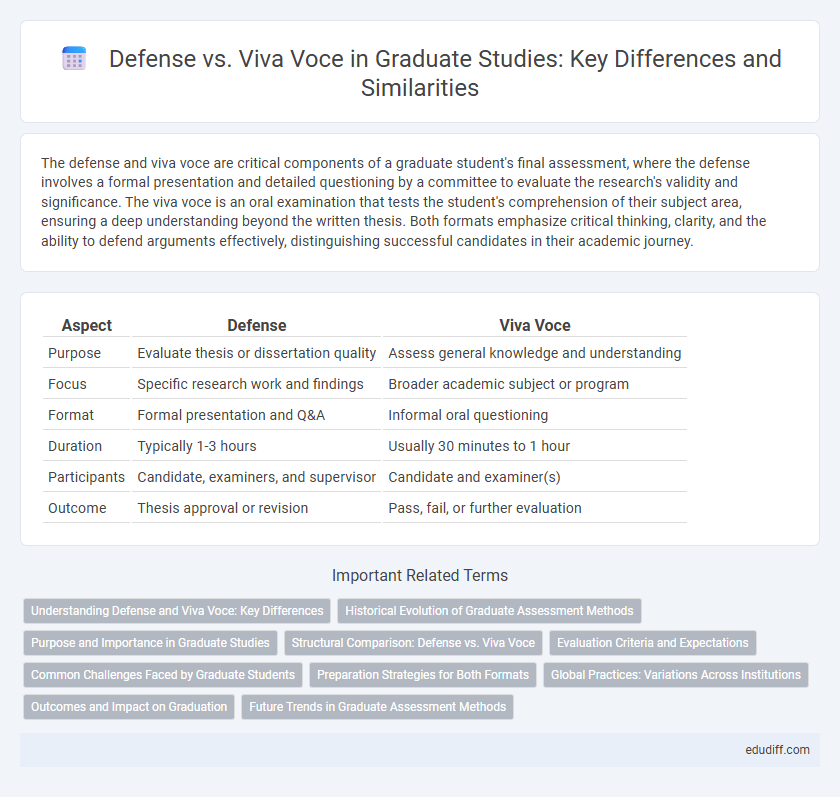The defense and viva voce are critical components of a graduate student's final assessment, where the defense involves a formal presentation and detailed questioning by a committee to evaluate the research's validity and significance. The viva voce is an oral examination that tests the student's comprehension of their subject area, ensuring a deep understanding beyond the written thesis. Both formats emphasize critical thinking, clarity, and the ability to defend arguments effectively, distinguishing successful candidates in their academic journey.
Table of Comparison
| Aspect | Defense | Viva Voce |
|---|---|---|
| Purpose | Evaluate thesis or dissertation quality | Assess general knowledge and understanding |
| Focus | Specific research work and findings | Broader academic subject or program |
| Format | Formal presentation and Q&A | Informal oral questioning |
| Duration | Typically 1-3 hours | Usually 30 minutes to 1 hour |
| Participants | Candidate, examiners, and supervisor | Candidate and examiner(s) |
| Outcome | Thesis approval or revision | Pass, fail, or further evaluation |
Understanding Defense and Viva Voce: Key Differences
Defense and viva voce are crucial stages in graduate assessments where candidates demonstrate their thesis understanding. Defense primarily involves a formal presentation and question session to justify research methods and outcomes, while viva voce emphasizes oral examination testing comprehensive knowledge on the subject. Understanding these distinctions helps graduates prepare effectively for evaluating their academic competence.
Historical Evolution of Graduate Assessment Methods
Graduate assessment methods have evolved significantly from traditional defense formats to the contemporary viva voce, reflecting shifts in academic standards and pedagogical approaches since the 19th century. The traditional defense, rooted in medieval European universities, emphasized formal oral challenges to a thesis, whereas the viva voce, commonly adopted in modern graduate programs, prioritizes interactive dialogue to assess a candidate's comprehensive understanding and critical thinking skills. This evolution underscores the transition from rigid, adversarial evaluations to more dynamic and formative assessment models in graduate education worldwide.
Purpose and Importance in Graduate Studies
Defense in graduate studies serves as a formal evaluation where candidates demonstrate mastery of their research, ensuring original contribution to the field and academic rigor. Viva Voce functions as an oral examination that assesses the depth of understanding, critical thinking, and ability to articulate complex ideas clearly. Both processes are crucial for validating expertise and readiness for professional or academic advancement.
Structural Comparison: Defense vs. Viva Voce
Defense and viva voce both serve as crucial methods for evaluating graduate research but differ structurally in format and interaction. Defense typically involves a formal presentation followed by a question-and-answer session with a panel of experts, emphasizing detailed explanation and justification of the research methodology and findings. Viva voce centers on an oral examination without a formal presentation, focusing on the student's ability to discuss and defend their thesis content in depth through direct dialogue with examiners.
Evaluation Criteria and Expectations
Defense evaluations emphasize the candidate's ability to justify methodology, interpret data accurately, and demonstrate comprehensive knowledge of research implications. Viva voce assessments focus on verbal articulation, critical thinking under questioning, and the clarity of presenting ideas orally. Both prioritize depth of subject understanding but differ in format, with defense requiring formal presentation and viva voce prioritizing interactive dialogue.
Common Challenges Faced by Graduate Students
Graduate students preparing for Defense and Viva Voce often encounter challenges such as managing immense stress and anxiety linked to public speaking and critical questioning. Navigating the extensive review of their research methodology, data interpretation, and theoretical framework can expose gaps in knowledge that require instant clarification. Time management and balancing revisions while meeting stringent academic standards intensify the pressure during these final assessment stages.
Preparation Strategies for Both Formats
Effective preparation strategies for Defense and Viva Voce include thorough understanding of thesis content and anticipating potential questions from examiners. Practicing clear articulation of research objectives, methodologies, and conclusions boosts confidence and clarity. Time management and mock sessions tailored to each format help in refining responses and reducing anxiety during the actual presentation.
Global Practices: Variations Across Institutions
Defense and viva voce represent distinct evaluation formats for graduate research, with global practices showing significant variation across institutions. In the United States, the term "defense" typically refers to a formal presentation and examination of a thesis or dissertation before a committee, whereas British and Commonwealth institutions often use "viva voce" to describe an oral examination focusing on the candidate's knowledge and understanding of their research. Institutional differences also extend to the assessment criteria, the presence of an external examiner, and the format's formality, reflecting diverse academic traditions and quality assurance standards worldwide.
Outcomes and Impact on Graduation
Defense evaluates the comprehensive understanding and originality of a graduate's thesis or dissertation, directly influencing the final approval for degree conferral. Viva voce serves as an oral examination to assess the candidate's ability to articulate research findings and defend methodologies, impacting the candidate's readiness for graduation. Successful completion of both ensures academic rigor and validates the candidate's qualification for graduation.
Future Trends in Graduate Assessment Methods
Defense and Viva Voce remain critical components of graduate assessment, emphasizing comprehensive understanding and oral proficiency. Emerging trends prioritize integrating digital platforms and AI-driven analytics to enhance real-time evaluation and personalized feedback. Hybrid models combining traditional defense with virtual presentations are gaining traction, ensuring flexibility and accessibility for diverse graduate cohorts.
Defense vs Viva Voce Infographic

 edudiff.com
edudiff.com